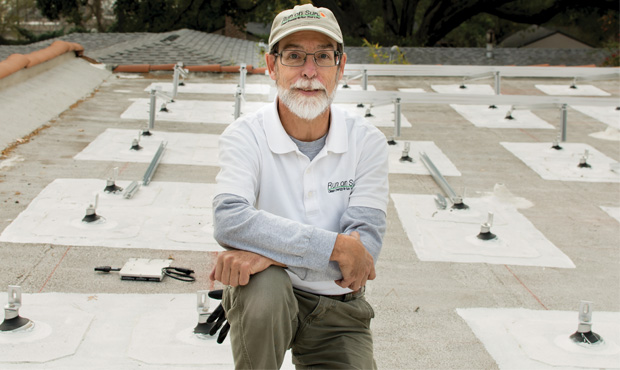Welcome to the
Run on Sun Monthly Newsletter

In this Issue: |
January, 2018
Volume: 9 Issue: 1
Solar Tariffs - What Does this Mean for You?After months of discussion, the Trump administration imposed 30% tariffs on imported solar cells and completed solar modules (like the LG modules that we use exclusively). The news made a pretty big splash, but it has mostly left potential solar clients confused about what it really means. We are still sorting through this ourselves, but here are our preliminary thoughts. How did we get here?Last April, bankrupt panel manufacturer Suniva—operating out of Georgia, but actually a subsidiary of China's Shunfeng International—filed a trade case claiming it was damaged by the "dumping" of inexpensive solar modules from China and elsewhere. They sought trade protection in the form of tariffs to drive up the cost of competitor's products, so that their panels would be cheap enough for people to purchase. We wrote at length about this at the time: Suniva - the Tail Wagging the Dog. Shortly thereafter, SolarWorld—another manufacturer operating in Oregon, but German owned—joined the case. The irony here is that some of the modules targeted by this trade case - like our LG modules - are already considerably more expensive than those made by Suniva or SolarWorld! Moreover, solar module manufacturing tends to be highly automated, meaning there just aren't that many jobs at issue; whereas rising prices could seriously impact solar installation jobs, which are far more numerous (and which can't be outsourced, for that matter!). Despite all of that, the Administration imposed tariffs in the name of protecting American jobs. What will this do to the cost of solar?Which brings us to the obvious question of what will this cost consumers. First and foremost, for our clients, if you have signed a contract with us, your cost will not change at all. Indeed, our pricing changes on February 7, so contracts signed before then will be unaffected as well. But we aren't going to see a full 30% price increase on modules because prices have been mostly flat for the past six months. That means that the normal price decreases we have grown accustomed to haven't happened while LG, and every other manufacturer, waited to see what would happen. In fact, it looks like our most popular module, the LG 335's, will only increase in price by 13%. Moreover, module costs are no longer the driving number in our solar installs, accounting for between 20 and 25% of the total system cost. That means that a module increase of 13% translates into something like a 3-4% overall increase. A useless waste of money to be sure - but not a game changer. Exempt Me!LG makes a premium product that is substantially different than the product offerings from either Suniva or SolarWorld. For example, the LG 335's that we have been installing lately are N-type modules, compared to the P-type modules sold by Suniva. Beyond that, the LG 360's that we are installing are back contact N-type modules, making them doubly more sophisticated that what the complainants offer. These are premium products that do not directly compete with the more standard, commodity offerings that they are accused of harming. Bottom line - people choose the LG modules that we are offering because they are a clearly superior product, albeit at a premium price. While I'm no expert here, it is my understanding that a manufacturer can petition to be exempted from the tariffs if they can demonstrate that they do not directly compete with the complainants' products. LG is pressing that point, and it is possible that they will prevail in their argument and be exempted entirely from the tariff, although we won't know that for some time. Stay Calm - and Go Solar!The bottom line here is that as short-sighted and ham-handed as this decision was, it will not radically change what we do and how our clients will be charged. If you were considering going solar, there will be little economic impact to the value of going forward due to this new tariff. So let's all take a breath, stay calm, and continue to do what we've been doing for more than a decade - helping people by putting the highest-value solar systems on their roofs, providing them with clean, affordable energy for years to come. |
“The bottom line here is that as short-sighted and ham-handed as this decision was, it will not radically change what we do and how our clients will be charged…”
Help Us Spread the News!


We use Angie's List to assess whether we're doing a good job keeping valued clients happy. Please visit AngiesList.com in order to grade our quality of work and client service.
Run on Sun Founder & CEO, Jim Jenal, Profiled in VoyageLAHere at Run on Sun, we place great emphasis on being a local company - both Sara and Jim live in Pasadena, and it is not uncommon for us to run into a client at the grocery store or post office. We believe that because we are so local—and support local institutions like the great NPR station, KPCC—that it informs how we approach our work. It isn't like we can build a project and disappear! So we also believe in working with local publications to spread our story. (For example, you may soon receive a copy of Neighbor2Neighbor in your mailbox, highlighting hand-picked local companies, where Run on Sun will be appearing for the second year in a row.) We like the idea of a local company supporting other local companies! Which makes us really pleased to highlight the recent profile of Jim in VoyageLA, an online publication that seeks to tell LA's stories. Under the headline, Meet Jim Jenal of Run on Sun in Pasadena, you can learn Jim's back-story, and the founding of Run on Sun. Check it out!
|
Run on Sun & KPCC Partner to Provide Solar Benefits
Here is the deal as shown on KPCC's Member Benefits page:
To qualify for this special offer, just show us your Benefits Card when we come out to do your free solar site evaluation. Wait, what, you aren't a Member yet? No worries - just click over to the KPCC website and make a one-time contribution of $60! (Wow, how is that for an immediate return on your investment?) Or better yet, become a sustaining member. It is the ultimate win-win! And look for us in the Spring Auction - we will have some special offers there as well! |


